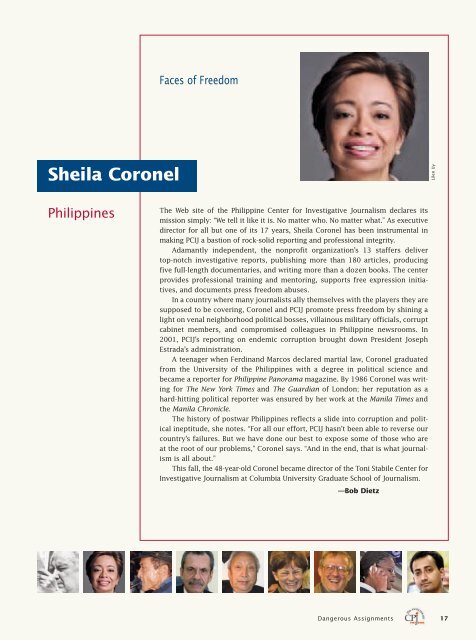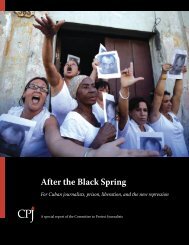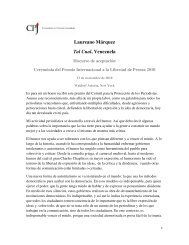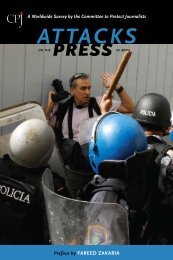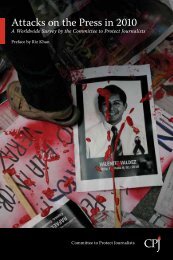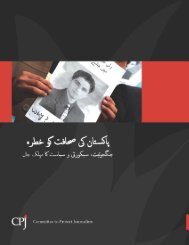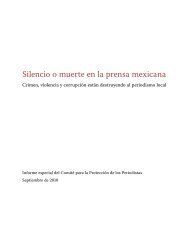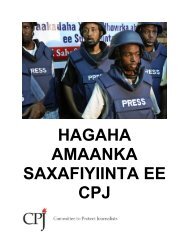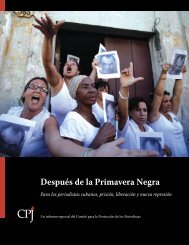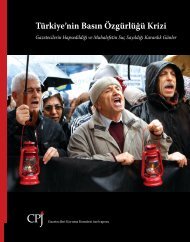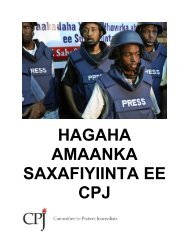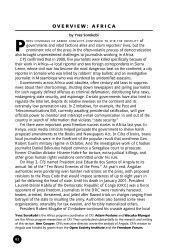Read the magazine online (PDF) - Committee to Protect Journalists
Read the magazine online (PDF) - Committee to Protect Journalists
Read the magazine online (PDF) - Committee to Protect Journalists
Create successful ePaper yourself
Turn your PDF publications into a flip-book with our unique Google optimized e-Paper software.
ing corruption. They were journalists like Dmitry Kholodov<br />
and Manik Saha.<br />
Kholodov, an investigative reporter tracking allegations<br />
of corruption in <strong>the</strong> Russian military, was murdered in 1994<br />
when a briefcase carrying what he thought <strong>to</strong> be classified<br />
documents exploded as it opened. Saha may have been many<br />
miles and years apart when he was killed in 2004 in<br />
Bangladesh, but he was also an investigative journalist killed<br />
by explosives, murdered when a bomb was thrown in<strong>to</strong> his<br />
rickshaw as he made his way home. His offense was probing<br />
<strong>to</strong>o deeply in<strong>to</strong> ex<strong>to</strong>rtion and Maoist groups, and a leftist<br />
political organization <strong>to</strong>ok credit for his death.<br />
Like so many o<strong>the</strong>r cases, investigations in<strong>to</strong> <strong>the</strong>ir<br />
deaths were delayed or halted outright. Nearly a decade<br />
after Kholodov’s killing, a Russian military tribunal acquitted<br />
<strong>the</strong> military officials accused of <strong>the</strong> crime. “It’s as if our<br />
son didn’t even exist and that no one ever killed him,”<br />
Kholodov’s mo<strong>the</strong>r, Zoya, <strong>to</strong>ld CPJ.<br />
In Bangladesh, a judge threw out <strong>the</strong> case against Saha’s<br />
accused killers and ordered a “reinvestigation.” “That’s <strong>the</strong>ir<br />
strategy,” said Mainul Islam Khan, a press advocate for <strong>the</strong><br />
Bangladesh Center for Development Journalism and Communication.<br />
“To delay as long as possible so <strong>the</strong> drive for<br />
justice becomes weaker and people will finally forget about<br />
<strong>the</strong> verdict.”<br />
While Kholodov and Saha’s deaths have been attributed <strong>to</strong><br />
governments and political groups, <strong>the</strong>ir cases are remarkably<br />
similar <strong>to</strong> those of hundreds of o<strong>the</strong>r journalists murdered<br />
since 1992. Cases are closed without explanation, evidence is<br />
ignored, and witnesses are intimidated or attacked.<br />
Colleagues of Orlando Sierra Hernández know this last<br />
fact well. Deputy edi<strong>to</strong>r of La Patria in Manizales, Colombia,<br />
Sierra was shot twice on a main street as he and his daughter<br />
walked back <strong>to</strong> <strong>the</strong> newsroom after lunch in January<br />
2002. Sierra had long probed corruption within la coalición,<br />
a political cabal that governed his province with absolute<br />
authority. In Sierra’s case, <strong>the</strong> hit man and two o<strong>the</strong>rs were<br />
convicted and jailed, but testimony and evidence pointing <strong>to</strong><br />
<strong>the</strong> intellectual authors have led nowhere. A judge and at<br />
least two prosecu<strong>to</strong>rs have beseeched investiga<strong>to</strong>rs <strong>to</strong> follow<br />
up on witness statements that a local politician ordered <strong>the</strong><br />
Diario La Patria<br />
Orlando Sierra Hernández<br />
hit. Three of those witnesses have since been killed, but <strong>the</strong><br />
politician has yet <strong>to</strong> be formally questioned by investiga<strong>to</strong>rs.<br />
“It would be a shame for Colombia’s judiciary system if<br />
this becomes ano<strong>the</strong>r case closed with only <strong>the</strong> material<br />
authors in prison when everything surrounding this murder—<strong>the</strong><br />
systematic disappearance of clues and sources,<br />
key witnesses gone missing or murdered—points at powerful<br />
local political interests behind <strong>the</strong> crime,” said Enrique<br />
San<strong>to</strong>s, edi<strong>to</strong>r of Bogotá’s El Tiempo, which has investigated<br />
<strong>the</strong> case extensively.<br />
The killings tell much about a country’s commitment <strong>to</strong><br />
<strong>the</strong> rule of law. In <strong>the</strong> few cases where justice has been served,<br />
police, advocates, and community leaders combined <strong>to</strong> condemn<br />
<strong>the</strong> killings and <strong>to</strong> prosecute <strong>the</strong> killers <strong>to</strong> <strong>the</strong> fullest. In<br />
<strong>the</strong> 1996 murder of Irish reporter Veronica Guerin, a near-folk<br />
Cover S<strong>to</strong>ry | Deadly News<br />
hero due <strong>to</strong> her groundbreaking<br />
investigations in<strong>to</strong> Dublin’s<br />
criminal underworld, community<br />
uproar led <strong>to</strong> <strong>the</strong> capture<br />
of three criminal leaders said<br />
<strong>to</strong> have ordered <strong>the</strong> murder.<br />
The Guerin slaying was one<br />
of <strong>the</strong> “defining moments in <strong>the</strong><br />
debate about law and order in<br />
Ireland,” said Ian O’Donnell, a<br />
professor of criminology at Veronica Guerin<br />
<strong>the</strong> University of Dublin. “The<br />
calculated killing of a journalist indicated that criminal<br />
gangs felt <strong>the</strong>y could operate with complete impunity.” The<br />
Irish government went on <strong>to</strong> establish a specialized law<br />
AP<br />
<br />
<br />
<br />
<br />
<br />
<br />
<br />
<br />
<br />
34 Fall | Winter 2006 Dangerous Assignments 35


